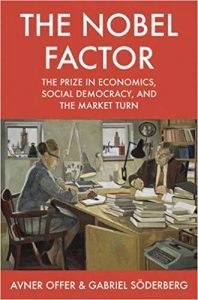 Sanjay G. Reddy in Development and Change:
Sanjay G. Reddy in Development and Change:
In The Nobel Factor, Avner Offer and Gabriel Söderberg help us to understand the politics behind the awarding of what is colloquially known as the Nobel Prize in Economics (and more correctly as the Swedish Central Bank Prize in Honour of Alfred Nobel). The main idea of the book is that the Prize has been often awarded to market‐oriented thinkers with the aim of undermining social democracy, of which Sweden was the most famous exemplar, in favour of market principles. This rather local agenda, pressed by the influential economist Assar Lindbeck (and presumably by others, although they receive less attention in the book) was, the authors argue, crucial to explaining the pattern of awards. The authors go so far as to contrast Economics with Social Democracy, in the process identifying the discipline as a whole with its most market‐oriented strand. The authors recognize that there were other elements within modern economics, but argue that the ‘high theory’ of neoclassical economics, interpreted as making the case for the optimality of markets, was greatly bolstered by the prize, especially after its first decade (when social democratic stalwarts such as Gunnar Myrdal won it.). The preponderance of University of Chicago faculty members among winners in the later period is one indication of this tendency, although the presence of exceptions even in the later years (notably Amartya Sen) is acknowledged (pp. 122–23). The authors state that ‘from an ideological point of view, the Nobel Committee was even‐handed in its awards, but the balance it achieved was biased to the right in comparison with opinion within the discipline, especially during the 1990s’ (ibid.).
The proposition that the pattern of prizes awarded reflected an agenda to change Swedish society should be distinguished from two others, each important in their own right, and distinct but potentially causally interrelated, that can be identified, namely 1.) that the prizes awarded actually did have the intended effect, or indeed any specific effect, on public policies shaping society (in Sweden or more generally), and 2.) that the pattern of the prizes awarded shaped the economics discipline, perhaps by offering prestige and authority to particular ideas or by shaping the activity of prize seekers.
More here.
